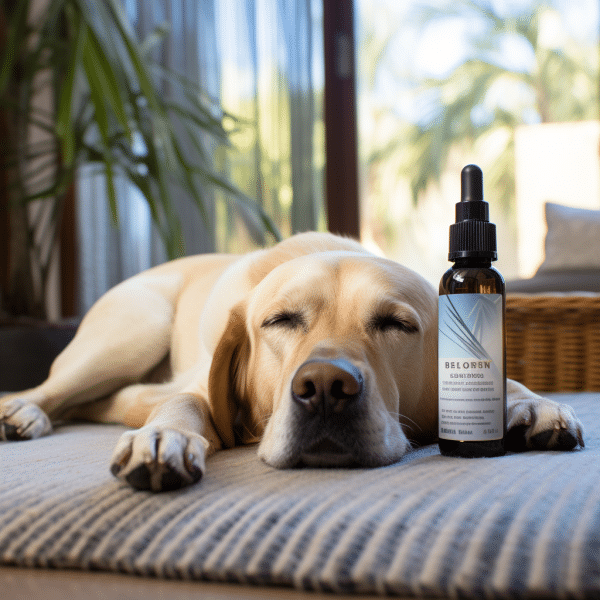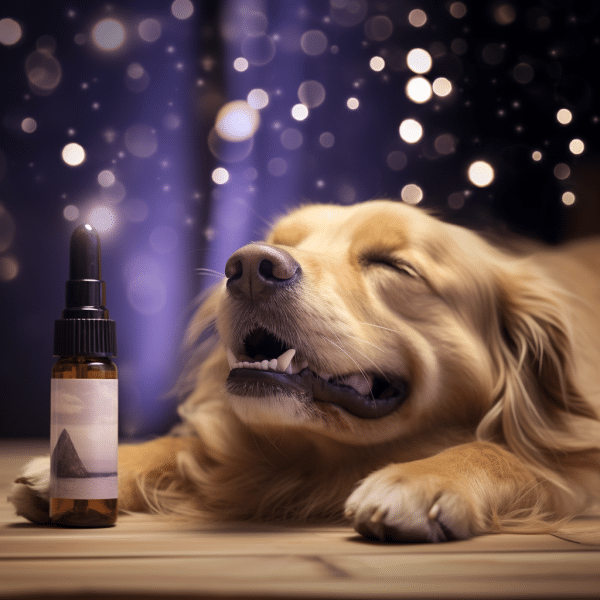Melatonin Spray For Dogs: Safety, Uses, Alternatives

Melatonin Spray For Dogs: Insomnia and jet lag are common ailments among humans—whose search for remedies often leads them to melatonin supplements. However, you may wonder if your dogs could benefit too from the use of melatonin spray. So, Is melatonin spray safe for dogs?
Remember—not all the things that work well on us do the same on dogs by virtue of their distinct biology so before putting anything into their bodies let’s take some time delving into melatonin—exploring not just its efficacy but any possible side effects or risks—to truly assess whether they can be safely administered to our canine friends who need better sleep quality just like we do.
What Is Melatonin and Its Effects On Dogs?

The pineal gland in humans produces Melatonin, a powerful hormone. Only maintaining your circadian rhythm is this natural agent’s main job! Melanin production increases at dusk, signaling to the body that it’s time to rest after a long day, while sunrise lowers melanin levels, waking us up to prepare for a new day. Melatonin appears to regulate canine sleep patterns like it does for humans. Melatonin works similarly to dogs’ ultradian rhythm, which includes extensive afternoon naps but enough nighttime sleep.
The utilization of this hormone dosing might be advantageous when dealing with canines facing difficulty falling or staying asleep.
However, melatonin has some other potential effects on dogs as well. It’s been suggested to help with anxiety and stress, both of which can hinder a peaceful sleep cycle. Some pet parents have even turned to melatonin to help their fur babies cope with stressful situations like thunderstorms, fireworks, or separation anxiety.
Use of Melatonin in Dogs
Melatonin isn’t just a supplement that’s used casually; it has some specific uses in the veterinary world as well. Many pet owners and specialists have employed melatonin to support dogs in coping with diverse challenges as it is considered a natural approach. Thus, exploring the cases that might require melatonin usage seems crucial. To help dogs suffering from anxiety disorders, melatonin is often used. This might include separation anxiety, noise phobia (such as fear of thunderstorms or fireworks), or even anxiety caused by changes in routine or environment.
It is critical to note that while this option has been shown effective as an anxiety reducer among some dogs it does not always work equally well for all pets. Therefore combining its use with other therapies and behavioral modifications may lead to a more successful outcome in treating anxiety-related issues concerning your beloved pooch. Properly regulating a dog’s sleeping patterns is essential for maintaining optimal physical and mental states akin to the importance emphasized in human life. When insomnia arises among canines.
Melatonin to Stimulate Hair Regrowth
It is crucial to take steps towards correcting this malady immediately by administering melatonin which aids regulation of their circadian rhythm leading them towards peaceful restfulness and allowing them fuller recovery during waking hours. Another advantage of melatonin supplementation is its efficacy in treating several dog health issues – including Cushing’s disease as it helps normalize cortisol levels and Alopecia which causes hair loss in dogs but can be treated with melatonin to stimulate hair regrowth.
Another point to consider is that melatonin may have a positive effect on regulating the reproductive cycles of female dogs. Although this isn’t a customary practice for household pets there are circumstances where it could be useful in selective breeding scenarios. Although there are indications that melatonin could help address certain issues in dogs, it’s essential to remember that every pooch has particular needs and preferences when it comes to treatments like these. One size does not necessarily fit all fur babies! Moreover.
Research backing up the use of melatonin with respect to these concerns is still being conducted and is relatively scarce at this time. For this reason, if you’re considering using supplements containing melatonin or have any related questions or concerns about your pets’ health status or well-being speak with your vet without delay! They can provide you with tailored recommendations based on their professional experience and insight into your pups’ unique situation.
Is Melatonin Spray Safe For Dogs?- Potential Risks
Generally, melatonin spray is considered safe for dogs, and side effects are usually rare. But like any supplement, it can sometimes cause unwanted reactions. These might include digestive upset such as vomiting or diarrhea, changes in behavior or mood, or increased heart rate.
Some dogs may also experience drowsiness or sedation, especially at higher doses. If you notice any unusual changes in your dog after administering melatonin, it’s crucial to seek immediate veterinary advice.
A basic problem always encountered when you start using melatonin spray on dogs is overdosing. While we have established that melanin occurs naturally, when given beyond the necessary dose, it could be harmful. Always stick to the recommended dosage and never administer more than your vet advises.
Some melatonin sprays might contain other ingredients, such as essential oils, which could cause additional issues if ingested or applied topically.
It is worth highlighting that some dogs may have a higher predisposition toward the potential dangers associated with administering melatonin supplements. This should be taken into consideration for groups such as young or mature pups alike.
Pregnant females and those diagnosed with pre-existing medical ailments may require extra care when managing the use of this hormone supplement.
For instance; in situations where a dog possesses renal failure disease; there is a possibility they may encounter setbacks processing melatonin thereby causing an increase in susceptibility to undesired side effects.
It’s worth keeping in mind that although melatonin may provide relief from certain symptoms; addressing the root cause rather than relying solely on symptom management is crucial for pets experiencing anxiety sleeping issues and other health complications.
It is vital to collaborate closely with a certified veterinarian who will offer guidance whilst formulating an appropriate plan aimed at getting your pet back onto its feet in no time.
Safe Administration of Melatonin for Dogs
Accurate medicine dosing helps dog owners maintain high pet care standards. Melatonin’s use in treating pets depends on breed size, age, medical history, and purpose. Expert veterinary assistance is needed to achieve optimal results without side effects. It’s important to follow prescribed dosages, which range from 1mg for small dogs to 6mg for large dogs.
Timing is key for melatonin’s effectiveness. For sleep issues, experts recommend taking the supplement 30 minutes before bed. Dosing before storms or automobile excursions may help your dog with anxiety. Melatonin spray can be sprayed straight into your dogs’ jaws or softly applied to their skin. This product should be administered safely. Before using, make sure it’s dog-only and read the directions. Keeping these factors in mind can maximize melatonin benefits for your pet!
After giving melatonin to your dog, exercise caution and observe them closely- especially during their first dose. Detect any signs of an unwelcoming reaction like vomiting, noticeable behavior changes, or unusual heartbeat rates. When in doubt about how to proceed next steps responsibly, contact a veterinarian.
Melatonin supplements may benefit your pet, but it alone cannot treat health or behavior issues. If your pet has such issues, seek good veterinarian care and canine mentorship. Melatonin can help, but using it alone may not be ideal.
Alternatives to Melatonin Spray for Dogs
Melatonin can be useful, but it’s good to try other remedies first. Natural solutions that use melatonin can help with common illnesses. If dogs are anxious, it’s best to try other treatments before turning to melatonin. Synthetic pheromones in collars or diffusers can calm dogs during tough situations. Calming vests and wraps that apply gentle pressure can help with anxiety in dogs. Playing music or giving interactive toys can also help dogs relax.
To help dogs with sleeping problems, check their sleep conditions and location. Avoid external distractions and make sure they have a comfortable bed. A consistent bedtime routine can also improve sleep quality. If your pet has health issues like Alopecia or Cushing’s Disease, melatonin supplements may not be enough. Follow your vet’s treatment plan for a complete recovery.
They may recommend medication modifications, food changes, or lifestyle changes tailored to your pet’s needs, so cooperate with medical care. Professional dog trainers generally get the best results with behavioral concerns. Trainers can help with fear, aggression, separation anxiety, and more. They personalize advice and methods to your dog’s requirements and situations. An overall healthy lifestyle may be one of the most effective ways to reduce dog health issues.
Developing habits like eating a balanced diet, exercising everyday, arranging regular doctor visits, and giving your dog lots of love and attention improves canine health. This multi-aspect approach to pet care empowers you as an owner and gives your beloved pet the best chance at a happy and healthy life!

Conclusion
When taking melatonin for your dog, consult a vet. This phrase emphasizes the significance of keeping your pet healthy and safe at all times.
Melatonin has little negative effects on dogs, however, improper administration can cause serious side effects. To effectively avoid these possibilities, see your veterinarian, who knows animal health best.






